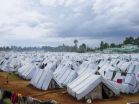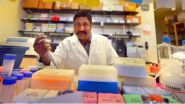(Press-News.org) Children as young as 3 years old know when they are not sure about a decision, and can use that uncertainty to guide decision making, according to new research from the Center for Mind and Brain at the University of California, Davis.
"There is behavioral evidence that they can do this, but the literature has assumed that until late preschool, children cannot introspect and make a decision based on that introspection," said Simona Ghetti, professor of psychology at UC Davis and co-author of the study with graduate student Kristen Lyons, now an assistant professor at Metropolitan State University of Denver.
The findings are published online by the journal Child Development and will appear in print in an upcoming issue.
Ghetti studies how reasoning, memory and cognition emerge during childhood. It is known that children get better at introspection through elementary school, she said. Lyons and Ghetti wanted to see whether this ability to ponder exists in younger children.
Previous studies have used open-ended questions to find out how children feel about a decision, but that approach is limited by younger children's ability to report on the content of their mental activity. Instead, Lyons and Ghetti showed 3-, 4- and 5-year-olds ambiguous drawings of objects and asked them to point to a particular object, such as a cup, a car or the sun. Then they asked the children to point to one of two pictures of faces, one looking confident and one doubtful, to rate whether they were confident or not confident about a decision.
In one of the tests, children had to choose a drawing even if unsure. In a second set of tests they had a "don't want to pick" option.
Across the age range, children were more likely to say they were not confident about their decision when they had in fact made a wrong choice. When they had a "don't know" option, they were most likely to take it if they had been unsure of their choice in the "either/or" test.
By opting not to choose when uncertain, the children could improve their overall accuracy on the test.
"Children as young as 3 years of age are aware of when they are making a mistake, they experience uncertainty that they can introspect on, and then they can use that introspection to drive their decision making," Ghetti said.
The researchers hope to extend their studies to younger children to examine the emergence of introspection and reasoning.
###
The work was supported by the National Science Foundation. END
'I don't want to pick!' Preschoolers know when they aren't sure
2013-03-13
ELSE PRESS RELEASES FROM THIS DATE:
Promising new drug treats and protects against radiotherapy-associated oral mucositis
2013-03-13
Mouse model studies show that administered genetically or topically, protein Smad7 protects against or heals mouth sores commonly associated with cancer treatment.
In some cancer patients treated with radiation, the mouth sores known as oral mucositis become so severe that feeding tubes are required for nutrition and narcotics are needed for pain. In fact, 40-70 percent of patients treated with upper-body radiation develop the condition to some degree. Currently, there is no FDA approved treatment. A University of Colorado Cancer Center study published this week in the ...
Political strife undermines HIV treatment
2013-03-13
PROVIDENCE, R.I. [Brown University] — As Kenyan citizens negotiated the tensions following the March 4 nationwide elections, memories of the violence that followed the December 2007 vote weighed heavily for many reasons. Among those in any nation with an HIV epidemic, argue authors of a new paper in AIDS Reviews, should be the long-term damage that political conflict can do to public health by disrupting treatment and thereby promoting resistance to antiretroviral drugs and treatment failure.
"It's the long-term consequences that make this a bigger issue," said lead author ...
Potential early indicator of kidney injury identified
2013-03-13
AUGUSTA, Ga. – A guidance cue that helps kidneys form may also be a red flag that they are in danger, researchers report.
Acute kidney injury, a common and serious complication of hospitalization, is on the increase worldwide, affecting an estimated 6 percent of all hospitalized patients and 30-40 percent of adults and children having cardiopulmonary bypass surgery.
About 10-15 percent of acute injuries translate to chronic kidney damage or failure that may require dialysis or a kidney transplant, said Dr. Ganesan Ramesh, kidney pathologist in the Vascular Biology ...
A European invader outcompetes Canadian plants even outside its usual temperature range
2013-03-13
Dog-strangling vine (Vincetoxicum rossicum) is an exotic plant originating from the Ukraine and southeastern Russia that is becoming increasingly invasive in southern Ontario, Canada. It has been found growing successfully in both disturbed and undisturbed areas, in open fields, forest edges and understories, parks, road edges and railway embankments. The invasive plant effectively competes for light by forming large and dense stands that climb over other plants. A study published in the open access, peer-reviewed journal NeoBiota explores the effects of V. rossicum invasion ...
The natural ecosystems in the Colombian Orinoco Basin are in danger
2013-03-13
The Orinoco River flows from the Andes in Colombia to the Atlantic in Venezuela. The area of the basin includes landscapes of the Andes, plains of the Llanos and the Guiana shield. Orinoco's tributary rivers form a basin considered to be the 3rd most important river system on the planet, and one of the most biologically diverse areas of the world.
Colombia has shown a strong commitment to the achievement of the Convention on Biological Diversity's 2010 biodiversity target, by promoting the conservation of at least 10% of its natural ecosystems. Protected Area categories ...
Astronomers observe planets around another star like never before
2013-03-13
PASADENA, Calif.—Thanks to a new high-tech gadget, astronomers have observed four planets orbiting a star relatively close to the sun in unprecedented detail, revealing the roughly ten-Jupiter-mass planets to be among the most exotic ones known.
The team, which includes several researchers from the California Institute of Technology (Caltech), describes its findings in a paper accepted for publication by the Astrophysical Journal.
The findings were made possible by a first-of-its-kind telescope imaging system that allowed the astronomers to pick out the planets amidst ...
Cancer researchers discover new type of retinoblastoma in babies
2013-03-13
(TORONTO, Canada – March 13, 2013) – A team of Canadian and international cancer researchers led by Dr. Brenda Gallie at the Princess Margaret Cancer Centre, University Health Network (UHN), has discovered a new type of retinoblastoma, a rapidly developing eye cancer that affects very young babies– a finding that can immediately change clinical practice and optimize care for these children.
The finding, published online today in Lancet Oncology, is a breakthrough in recognizing that a single cancer gene (an oncogene) drives an aggressive retinoblastoma that starts long ...
Canadians support interventions to reduce dietary salt
2013-03-13
Philadelphia, PA, March 13, 2013 – Many Canadians are concerned about dietary sodium and welcome government intervention to reduce sodium intake through a variety of measures, including lowering sodium in food, and education and awareness, according to a national survey. The top barriers to limiting sodium intake are a lack of lower sodium packaged and processed foods and lower sodium restaurant menu options.
"Canadians are supportive of government intervention to lower salt intake," says lead investigator Mary R. L'Abbe, PhD, Professor and Chair of the Department of ...
Structured weight loss program helps kids from low-income families lower BMI
2013-03-13
Philadelphia, PA, March 13, 2013 – Overweight and obese children in low-income households can meet or exceed the Expert Committee Recommendations Regarding the Prevention, Assessment, and Treatment of Childhood and Adolescent Overweight and Obesity when given access to a structured weight management program, according to a new study published in Academic Pediatrics.
The epidemic of overweight and obesity in the United States affects children, particularly those in low-income families, where they are at higher risk due to unhealthy diets and consumption of higher calorie, ...
High-performance, NW-OPTs open the way for optoelectronic device miniaturization
2013-03-13
Research team of Ulsan National Institute of Science and Technology (UNIST), Ulsan, South Korea, developed high-performance organic phototransistors (OPTs) based on single-crystalline n-channel organic nanowires.
Phototransistors are a kind of transistors in which the incident light intensity can modulate the charge-carrier density in the channel. Compared with conventional photodiodes, phototransistors enable easier control of light-detection sensitivity without problems such as the noise increment. However, to date, the research has mostly focused on thin-film OPTs, ...




